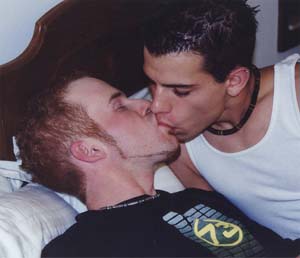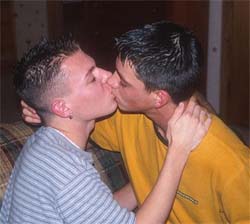
|
Minor Details
And when LGBT people join the parade and fit in, they do look "straighter." They look just like the ideal couple our culture is selling us. Yet we may also wonder why something still seems to be missing in relationships we think should be more than they turn out to be. Here are seven false, unhelpful, but popular, messages keeping us stuck. 1) Being homosexual or bisexual hinders close, long-term relationships. This idea is so universal and persistent, both blatantly and subtly, that we pick it up unconsciously. We blame lesbians and gay men for something, as if it's about all of them as a group, as if the fault is a characteristic of gay men or lesbians or bisexual people that's as inborn as sexual orientation: "All gay men are interested in is…." "Lesbians are always…." It's in our jokes, bitterness, and complaints about each other. But the reality is, there is nothing "wrong" that has anything to do with sexual orientation, no matter what the larger culture claims.
The dominant meaning of society's homophobia is "be too afraid to get close to your own sex." The purpose of this message is to turn boys into warriors, and girls into a warrior support system. The installation of this fear creates suspect, self-destroying, competitive, and distancing same-sex relationships for people of all orientations. Even people who have accepted that they are not heterosexual, internalize it. An undercurrent of our closest relationships, as a result, is fear that if we become vulnerable to the gender to whom we are attracted, we'll get hurt again, taken advantage of, and, ultimately, abandoned. Same-sex relationships are not inherently scary. Society teaches us to fear same-sex closeness.
3) Out there is that one person who will take away my loneliness and feelings of incompleteness, and prove I am worthy of a relationship. Though any good counselor will tell us this message is psychologically sick, it's still as common as dirt. People of every orientation are supposed to live as if they are half a person until someone makes them whole. A good dose of therapy is the antidote, or a group of supportive, non-judgmental, empathetic, listening friends. The search to remove the feeling that something is missing in our lives through a relationship puts too heavy a burden on a relationship. It can lead to settling, being lonely even in a relationship, or assuming that it's the "greener grass" of the next relationship that will be the answer. 4) Only the really lucky meet the right person. If the stars are right and the moon's just right, if I'm in the right place and it's the right time, if my face looks right, if my hair's just right, if my body's just right, if I dress just right, if I smile just right, if I'm the right age, if I drive the right car, if I say the right things, if I smell just right, if I don't over-do it but I don't under-do it, then maybe, just maybe, I'll find the one Ms. or Mr. Right. This romantic myth sells products by claiming they'll make us just right. It also makes me a victim of all these "ifs" instead of believing I'm all right and communicating to the world that I'm at ease with myself. If my relationship isn't fulfilling and promoting my growth, it's not about luck, but about my own choices.
Growing beyond old relationships requires examining why we got into them, what needs they fulfilled for us that are not healthy but kept us in them, how we may have expected our partner to do what our parents didn't do for us, why we felt insecure, how we gave up our own growth and goals to be in the relationship, why we settled for less than everything, and probably more. 6) My love will change my partner to be what I want in her or him. This common idea is a definition of co-dependency. It also keeps abused partners with their abusers. If I just love them more or enough, if I just change by actions for them, if I just try to understand them more, then everything will be okay. Frankly, this doesn't work. And to love someone in order to get them to love me in return isn't love at all. It's unhealthy, a statement of our own feelings of unworthiness, of our need to get the love from our partner we didn't get from parents, and of our fear that the alternative to this relationship is being left alone. It's a clue that we need help, counseling, support. 7) Straight relationships provide the model for gay ones. It looks inviting to settle down with all the "advantages" of dating and marriage straight people have. But it only takes a moment to remember that half of those marriages end in divorce and the other half aren't doing that well. Keeping up appearances, settling for unhappiness, accepting unspoken agreements to get by, and keeping too busy to face each other as vulnerable, intimate partners is rampant in straight relationships. The key to better relationships isn't found in these messages. It's in rejecting them. Becoming healthy individuals has to be our first goal. And when we no longer need salvation in that one right relationship, we'll be ready for the better relationships that we can develop, grow with, and work at to make them healthy affirmations of real life.  Robert N. Minor, Ph.D., is author of Scared Straight: Why It's So
Hard to Accept Gay People and Why It's So Hard to Be Human (HumanityWorks!,
2001) and Professor of Religious Studies at the University of Kansas in
Lawrence. He may be reached through www.fairnessproject.org.
Robert N. Minor, Ph.D., is author of Scared Straight: Why It's So
Hard to Accept Gay People and Why It's So Hard to Be Human (HumanityWorks!,
2001) and Professor of Religious Studies at the University of Kansas in
Lawrence. He may be reached through www.fairnessproject.org.
|
 Photo Courtesy:
Photo Courtesy:  2) Same-sex closeness is naturally scary, uneasy, and insecure.
2) Same-sex closeness is naturally scary, uneasy, and insecure.
 Photo Courtesy:
Photo Courtesy: